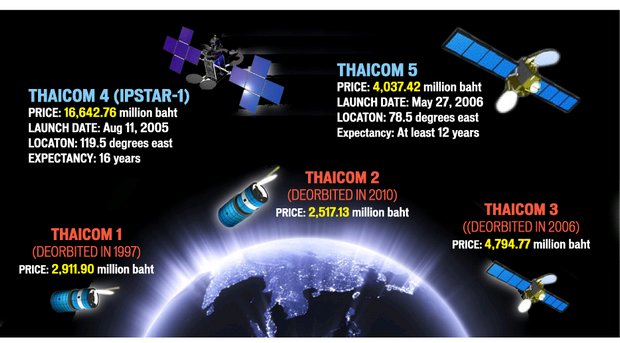
The cabinet on Tuesday approved in principle applying a public-private partnership (PPP) format for the country's satellite management in lieu of the concession system once the existing contract expires in 2021.
Government spokesman Buddhipongse Punnakanta said the PPP format was deemed the most appropriate and transparent, offering more benefits to the country than the concession format.
The Digital Economy and Society (DE) Ministry will be tasked with drafting the PPP process, Mr Buddhipongse said.
"Based on the latest cabinet approval, there will be no contract renewal or extension for any domestic communication satellites," he said. "That means there will no longer be a concession system once existing contracts expire."
Thaicom hailed the cabinet resolution, saying it comes as a good sign offering the clarity that the company has been wanting for years.
The government has clarified the future of Thaicom's satellites following the end of the concessions, a positive sign years in waiting, said Thaicom chief executive Anant Kaewruamvongs.
Particularly, the resolution gives clarity on doing business when the concessions on the Thaicom 4, 5 and 6 satellites under the DE Ministry expire in 2021.
"There was uncertainty for years about what way the company could do business related to the satellite assets after 2021," Mr Anant said.
He said he must wait for more official details from the government before giving any directions.
"Several critical details need to be discussed that may take some time," Mr Anant said.

Establishment of the space programme and Thaicom's first five satellite launches occurred when the company was under control of now-fugitive ex-prime minister Thaksin Shinawatra.
According to Mr Anant, Thaicom now operates three satellites under a revenue-sharing based concession regime: Thaicom 4 or iPSTAR, a broadband satellite; and Thaicom 5 and Thaicom 6, both of which are broadcasting satellites.
Thaicom 4 is on orbital slot 119.5 and Thaicom 5 at 78.5 East.
Thaicom also operates Thaicom 7 and 8 under a single licence from the National Broadcasting and Telecommunications Commission, requiring only a 5.75% licence fee payment to the NBTC.
Thaicom 7 was launched into orbit in 2012 and has been in operation since 2014. Thaicom 8 was launched into orbit in May 2016.
The government previously forced Thaicom 7 and 8 to return to the old concession system instead of a licensing regime, saying the existing 5.75% licence fee payment to the NBTC was too low compared with the 20.5% revenue sharing of the concession regime.
In addition, the government tried to set a new operating fee structure for satellite businesses to profit from the growing space economy.
Thaicom has been negotiating with a representative of the government during the past two years but has yet to reach any conclusion about the new operating fee structure and has not yet settled the dispute over Thaicom 7 and 8.
The government proposed creating a "state satellite or national satellite" initiated by the office of the National Digital Economy and Society Commission in 2017.
The national satellite was targeted to launch on the orbital slot at 119.5 East, replacing Thaicom 4, after the concession expired in 2021.
The government offered three alternatives for the national satellite formation: a CAT Telecom-led operation or state-owned formula that private partners can join in investment; a shareholding structure under terms of the Public-Private Joint Venture Act; or a private company (Thaicom) leading the operation and CAT buying 30% of the transponder's capacity to operate for the public's benefit.
The national satellite proposal has not advanced in over a year.